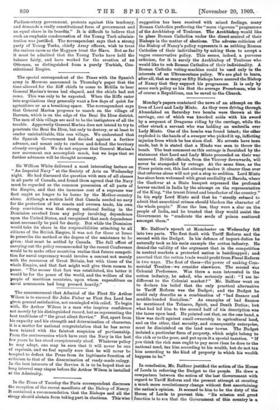Mr. Balfour's speech at Manchester on Wednesday fell into two
parts. The first dealt with Tariff Reform and the second with the Budget. In his defence of import-duties he naturally took as his main example the cotton industry. He denied the validity of the argument that in the competition in neutral markets a protected nation is handicapped ; and asserted that the cotton trade would profit from.Fiscal Reform in two ways.. The first of these—the power of making Com- mercial Treaties—we consider elsewhere. The second was Colonial Preference. Was there a man interested in the cotton industry, he asked, who seriously said: "I am in- different to the Colonial market P" Mr. Balfour went on to declare his belief that the only practical alternative to Tariff Reform was the Budget; and the Budget he could only describe as a combination of "bad finance and muddle-beaded Socialism." As examples of bad finance he mentioned the Tobacco, Spirit, and Death Duties ; but what had led him to the second half of his description w6a the taxes upon land. He pointed out that, on the one hand, a blow was dealt against small ownership in agricultural land, and on the other, that security, and consequently enterprise, must be diminished on the land near towns. The Budget isolated a particular form of property, which might belong to the rich or to the poor, and put upon it a special taxation. "If you think the rich man ought to pay more than he does to the national need, tax him according to his wealth, but do not tax him according to the kind of property in which his wealth happens to be."
























































 Previous page
Previous page